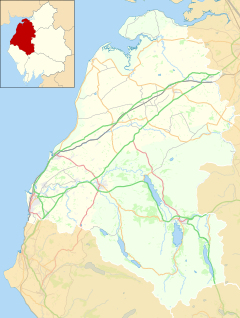Plasketlands
Plasketlands is a small settlement in the civil parish of Holme St. Cuthbert[1] in Cumbria, United Kingdom. It is located approximately a quarter-of-a-mile south-west of Goodyhills, a quarter-of-a-mile to the south of the hamlet of Holme St. Cuthbert, and one-and-a-half miles east of Mawbray. Carlisle, Cumbria's county town, is twenty-four miles away to the north-east. The settlement is divided into two distinct parts: High Plasketlands and Plasketlands.[2] Jordan beck, a tributary of the Black Dub beck, flows through Plasketlands on its way to Allonby Bay.
History and etymology[]
The name Plasketlands comes from the Old English plashet, meaning "a fence of living wood". It was historically spelled several different ways, including Plassegaytt, Plaskitlands, Plascade-lands, and Plesketh Landes.[3]
Evidence of settlement at Plasketlands goes back thousands of years. A palisade of posts at Plasketlands has been radiocarbon dated to somewhere between 4000 BC and 2500 BC.[4]
References[]
| Wikimedia Commons has media related to Plasketlands. |
- ^ "Cumbria Atlas (w/ parish boundaries enabled)". Retrieved 7 August 2015.
- ^ "Google Maps - Plasketlands". Retrieved 7 August 2015.
- ^ Holme St. Cuthbert History Group (2004). Plain People: Bygone Times on the Solway Plain. ISBN 0954882318.
- ^ "Liverpool museums: Prehistoric period resource assessment" (PDF). Retrieved 7 August 2015.
- Hamlets in Cumbria
- Holme St Cuthbert
- Cumbria geography stubs



